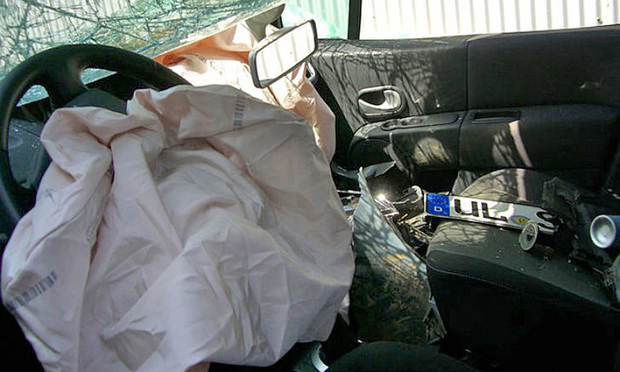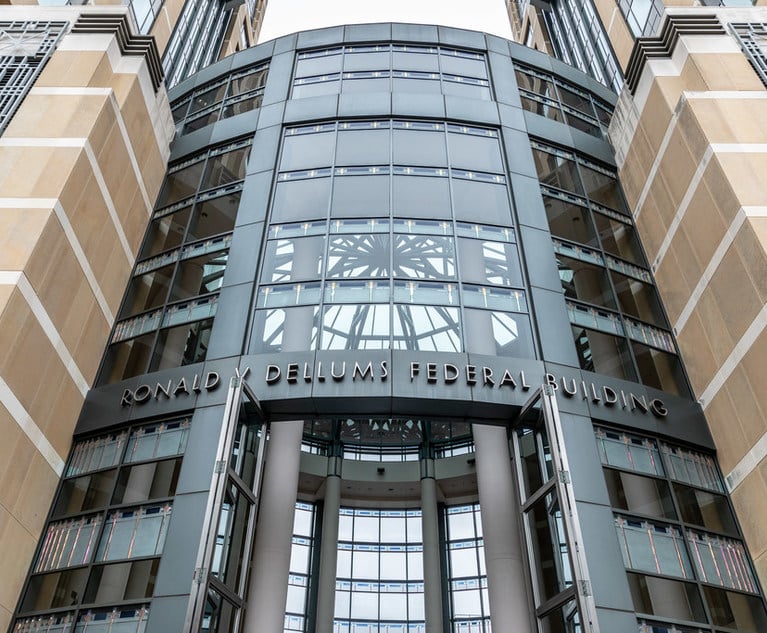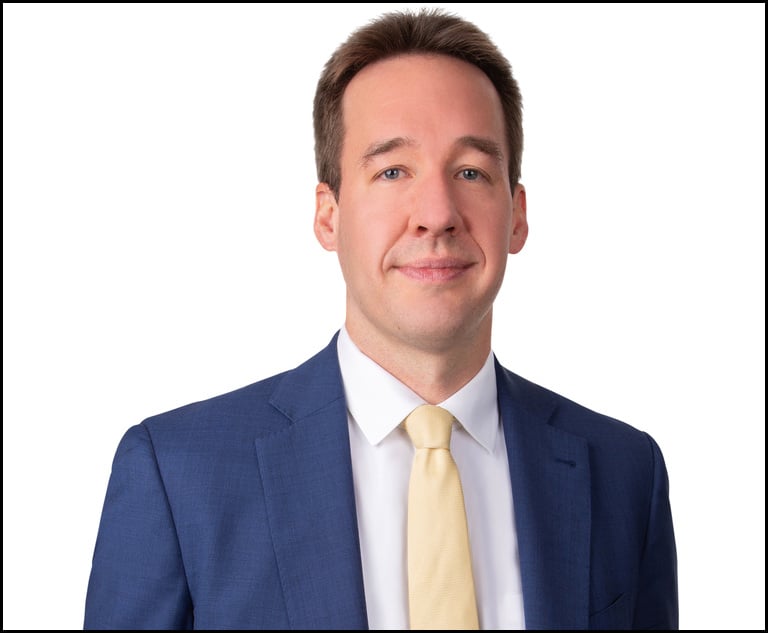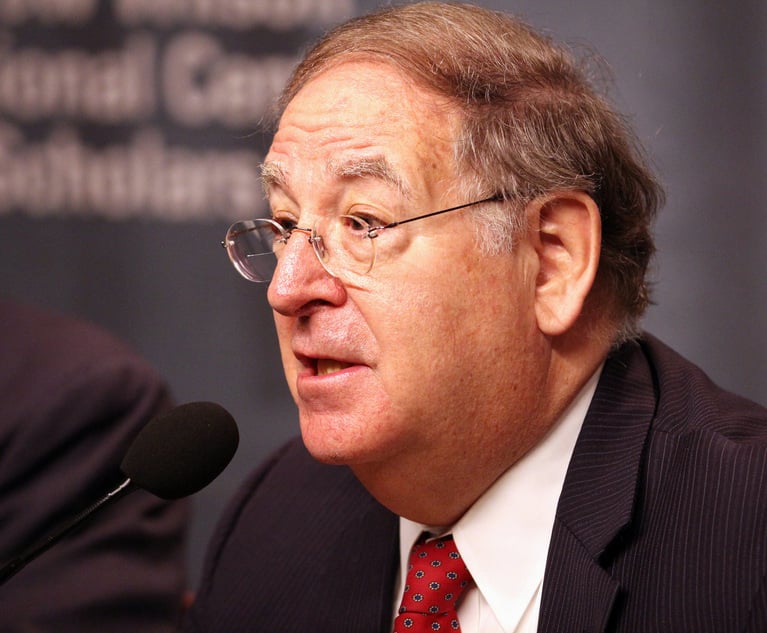Takata Deal Better Than Nothing, Say Lawyers for Air-Bag Plaintiffs
That's how plaintiffs lawyers characterized a settlement reached this week in the Takata bankruptcy that could provide up to $130 million in compensation to victims of exploding air bags.
February 15, 2018 at 03:19 PM
5 minute read

It's better than nothing.
That's how plaintiffs lawyers characterized a settlement reached this week in the Takata bankruptcy that could provide up to $130 million in compensation to victims of exploding air bags. Plaintiffs lawyers praised the deal as a means to pursue damages against Takata, whose insolvency has long raised doubts about the likelihood of compensation for those claiming injuries or deaths. And, in all cases except Honda, plaintiffs could still sue the automakers in court under the settlement.
“Obviously, all of our clients—and I think they're in excess of 40—are very frustrated with how the Takata bankruptcy has impinged on their recovery and their rights. But having said that, they're very pleased that they're getting something,” said Kevin Dean of Motley Rice, who represented the plaintiffs in the bankruptcy. “Before this bankruptcy started, they were getting zero. And now, they're getting some compensation, and so they feel some relief.”
More than 42 million vehicles have been recalled over Takata air bags, the largest automotive recall in U.S. history, for exploding unintentionally, in some cases unleashing metal shrapnel into cars. More than 20 people have died, and hundreds more injured from the air bags. In June, Takata's North American unit, TK Holdings Inc., filed for Chapter 11 bankruptcy in Delaware.
A committee representing air-bag victims had opposed Takata's reorganization plan. But on Feb. 10, lawyers representing the victims in the bankruptcy reached a deal in which 13 automakers agreed to drop some of their creditor claims against Takata in order to set up a trust that would compensate those claiming injuries or deaths. Plaintiffs lawyers predicted the trust could be between $80 million and $130 million.
Those suing for personal injuries or wrongful deaths have had limited options in pursuing damages, particularly against Takata, whose nearly $1.6 billion sale to Key Safety Systems, a subsidiary of China's auto parts supplier Ningbo Joyson Electronic Corp., excludes air-bag liabilities.
“It gives victims the security they'll need to be able to recover some money from Takata,” said Curtis Miner, a partner at Colson Hicks Eidson in Coral Gables, Florida, who is head of the personal injury and wrongful death cases in multidistrict litigation over Takata air bags. “And they can still pursue their claims and have their day in court.”
U.S. Bankruptcy Judge Brendan Shannon has scheduled a hearing on Friday to confirm Takata's amended Chapter 11 exit plan.
But the settlement is far from perfect. For one thing, the amount in the trust isn't certain.
“It's not like they're contributing hard dollars from their own checking accounts,” Miner said. “In the bankruptcy, the automakers have claims, substantial claims, like any other creditor. They're contributing a large percentage of their claims.”
A lot depends on what remains available to distribute, and insurance companies are involved. Miner said he expected some of those details to be ironed out within 60 days.
The settlement does not prevent plaintiffs from making claims while continuing to pursue lawsuits against the automakers, except for Honda Motor Co., which carved out a “channeling injunction” that set up a claims process but barred claimants from also seeking damages in court.
“What that means is if I'm a Honda driver in the future and get in an accident, I can't sue Honda in court to start because I'm channeled into this procedure,” he said. “Once the trustee has made his final determination, Honda is obligated to pay the full amount. This money does not come out of the trust fund. It comes out of Honda's pockets.”
But Honda, which was the automaker with the most air-bag lawsuits, has settled most of its cases. More than 50 lawsuits remain against Toyota, BMW, General Motors, Subaru, Nissan, Mazda, Ford and others.
“The bulk of the cases currently filed in court are against other automakers,” Miner said, “and the channeling injunction will have no impact on those cases.”
But that could change. Six automakers, including Honda, Toyota and Nissan, already have paid a total of more than $1.2 billion to settle class actions brought by consumers over economic losses. For the automakers, the settlement could be an experiment, with Honda as the “stalking horse,” said Peter Henning of Wayne State University Law School.
“Their hope is if this works out for Honda, other manufacturers will opt in because this is a much more expeditious process than litigating,” he said. “They've got a lot of claims, but they're unsecured creditors just like the tort plaintiffs are in regard to Takata. For their air-bag cost claims, they may get very little themselves, but the tort claims continue.”
Any money from the Takata bankruptcy trust also could be used as offsets against any judgments, settlements or verdicts, he said.
In the meantime, victims also have a third resource: A $125 million victim fund set up as part of a $1 billion criminal plea deal that Takata Corp., the parent corporation based in Japan, reached with the U.S. Department of Justice last year. But according to court papers filed in January in the criminal case by special master Eric Green, the value of injury claims against Takata “massively exceeds” the amount of the fund. He predicted claims could total between $710 million and $1.5 billion.
This content has been archived. It is available through our partners, LexisNexis® and Bloomberg Law.
To view this content, please continue to their sites.
Not a Lexis Subscriber?
Subscribe Now
Not a Bloomberg Law Subscriber?
Subscribe Now
NOT FOR REPRINT
© 2025 ALM Global, LLC, All Rights Reserved. Request academic re-use from www.copyright.com. All other uses, submit a request to [email protected]. For more information visit Asset & Logo Licensing.
You Might Like
View All
Read the Document: DOJ Releases Ex-Special Counsel's Report Explaining Trump Prosecutions
3 minute read
Crypto Exchange’s ‘Meteoric Rise’ Leads to Nationwide Class Action Trend
4 minute read
Veteran Federal Trade Law Enforcer Joins King & Spalding in Washington
4 minute read
'Thoughtful Jurist': Maryland US District Senior Judge Messitte Dies After Short Illness
4 minute readTrending Stories
Who Got The Work
J. Brugh Lower of Gibbons has entered an appearance for industrial equipment supplier Devco Corporation in a pending trademark infringement lawsuit. The suit, accusing the defendant of selling knock-off Graco products, was filed Dec. 18 in New Jersey District Court by Rivkin Radler on behalf of Graco Inc. and Graco Minnesota. The case, assigned to U.S. District Judge Zahid N. Quraishi, is 3:24-cv-11294, Graco Inc. et al v. Devco Corporation.
Who Got The Work
Rebecca Maller-Stein and Kent A. Yalowitz of Arnold & Porter Kaye Scholer have entered their appearances for Hanaco Venture Capital and its executives, Lior Prosor and David Frankel, in a pending securities lawsuit. The action, filed on Dec. 24 in New York Southern District Court by Zell, Aron & Co. on behalf of Goldeneye Advisors, accuses the defendants of negligently and fraudulently managing the plaintiff's $1 million investment. The case, assigned to U.S. District Judge Vernon S. Broderick, is 1:24-cv-09918, Goldeneye Advisors, LLC v. Hanaco Venture Capital, Ltd. et al.
Who Got The Work
Attorneys from A&O Shearman has stepped in as defense counsel for Toronto-Dominion Bank and other defendants in a pending securities class action. The suit, filed Dec. 11 in New York Southern District Court by Bleichmar Fonti & Auld, accuses the defendants of concealing the bank's 'pervasive' deficiencies in regards to its compliance with the Bank Secrecy Act and the quality of its anti-money laundering controls. The case, assigned to U.S. District Judge Arun Subramanian, is 1:24-cv-09445, Gonzalez v. The Toronto-Dominion Bank et al.
Who Got The Work
Crown Castle International, a Pennsylvania company providing shared communications infrastructure, has turned to Luke D. Wolf of Gordon Rees Scully Mansukhani to fend off a pending breach-of-contract lawsuit. The court action, filed Nov. 25 in Michigan Eastern District Court by Hooper Hathaway PC on behalf of The Town Residences LLC, accuses Crown Castle of failing to transfer approximately $30,000 in utility payments from T-Mobile in breach of a roof-top lease and assignment agreement. The case, assigned to U.S. District Judge Susan K. Declercq, is 2:24-cv-13131, The Town Residences LLC v. T-Mobile US, Inc. et al.
Who Got The Work
Wilfred P. Coronato and Daniel M. Schwartz of McCarter & English have stepped in as defense counsel to Electrolux Home Products Inc. in a pending product liability lawsuit. The court action, filed Nov. 26 in New York Eastern District Court by Poulos Lopiccolo PC and Nagel Rice LLP on behalf of David Stern, alleges that the defendant's refrigerators’ drawers and shelving repeatedly break and fall apart within months after purchase. The case, assigned to U.S. District Judge Joan M. Azrack, is 2:24-cv-08204, Stern v. Electrolux Home Products, Inc.
Featured Firms
Law Offices of Gary Martin Hays & Associates, P.C.
(470) 294-1674
Law Offices of Mark E. Salomone
(857) 444-6468
Smith & Hassler
(713) 739-1250










